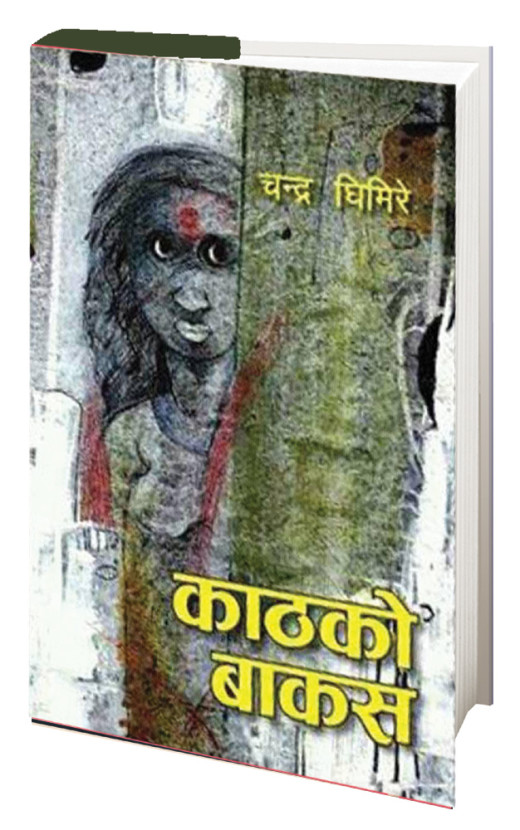Wooden boxes and broken dreams (Book Review)
 Raj Kumar Baral / Kathmandu: Poetry is as old as human civilisations and has always been an instrumental tool that people have used to give words to their feelings. Sometimes it is used as a means for releasing spontaneous creativity; at other times it serves as a mirror that reflects the social, political and economic realities of the society that it takes seed in, even when the reflection does not paint a rosy picture. Chandra Ghimire’s latest book of poems, Kaath ko Baakas, is of the latter variety and paints a vivid picture of the Nepali society and all of its various fault-lines.
Raj Kumar Baral / Kathmandu: Poetry is as old as human civilisations and has always been an instrumental tool that people have used to give words to their feelings. Sometimes it is used as a means for releasing spontaneous creativity; at other times it serves as a mirror that reflects the social, political and economic realities of the society that it takes seed in, even when the reflection does not paint a rosy picture. Chandra Ghimire’s latest book of poems, Kaath ko Baakas, is of the latter variety and paints a vivid picture of the Nepali society and all of its various fault-lines.
Though the 43 poems in the anthology were composed when the poet was in India (mostly in Kolkata), they resonate with the harsh realities that the Nepali society has undegone in the recent decades. Unemployment, for instance, is a theme that the poet visits time and again in his poems that are filled with longing, nostalgia and sadness for those that have left the country to seek greener pastures elsewhere. The namesake of the book, the poem titled Kaath ko Bakas, weaves the sad imagery of the aspiring youth who leave Nepal with manifold dreams, only to return home, dead and packed in wooden coffins. Likewise, the poem Tyo Bartaman Mai Thiye explores how many of the youth migrating abroad have left their families trapped under mountains of debt, all the while tugging at the larger question of where Nepal would have been had these youth found meaningful work in their hometowns instead of having to flock to foreign shores.
Although as the title suggests, migration is a theme that appears continually through the anthology, other major issues that Ghimire touches upon include human trafficking, the plight of women workers, the impact of the Maoist insurgency, the sufferings of a daughter, child-marriage, polygamy, and the crushed dreams of the everyday citizenry.
In addition, Ghimire also offers a strong statement against the inherent violence of a tyrannical rule of the few over the many in some of the poems. He presents this not just as problems confined to Nepal, but as a universal problem. He talks about how ironic it is that today, even at the height of the human civilisation, that violence of the many still continues unabated around the world. He also sees it fit to criticise modern day politics, directing his sharp-witted arrows towards those ill practices that continue to plague the Nepali society because they remain backed by the political class.
From the collection, Pariwartan, one of the most poignant verses of the anthology, honours change, treating it not as an easy cup of tea but as an outcome of great effort and strife. In it, he writes:
Change does not come easy
Like the snacks,
Which accompany the wine
At a high-profile dinner party.
Another poem, Bazaar, deals with the real life situations of an average man who feels he is teased by the soaring market prices that are no longer affordable to his meager earnings. He is an overrated salaried man and much is expected of him, by the insurance agent, a principal of a boarding school, a taxi driver, and even vendors in the street. However, all remain unaware of his real life story—a shout-out to the quiet desperate lives that we all live in ourselves, without being able to express it to the world.
Through all of his poems, Ghimire’s main objective is to reflect upon the contemporary issues of our society. He has, to that end, used largely colloquial language, that steers clear of the linguistic jargons and dogmatic literary idiosyncrasies, which makes the anthology relatively accessible to all. True to his claim in the preface, entitled Manifesto, all of Ghimire’s poems are narrative in nature, and peppered with vivid imagery. One of the advantages for readers in reading such poems is that they need not spend much time in understanding the intended meaning. However, the style steals from the poetry’s aesthetics, which may be off-putting for readers who read poetry to unravel meanings hidden in between the lines.
The anthology gives the readers a long list of problems that the Nepali society is facing, but it does not offer up any viable solutions. The collection also does get repetitive at times as themes recur, often to little end but to thicken the size of the book, while failing to raise issues previously not mentioned. It feels at times that it would have better served the poet if he had used the space to delve deeply into the themes like he did with the title poem instead of spreading out the ideas like too little butter over too much bread.
Had these minor shortcomings been addressed, his vision and expression would have perhaps found a stronger tone and his poems found a wider readership than he presently enjoys. Source: The Kathmandu Post
